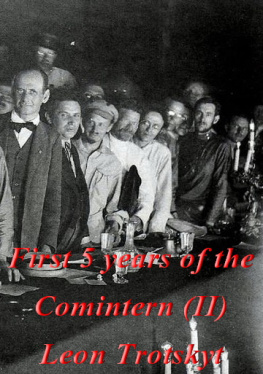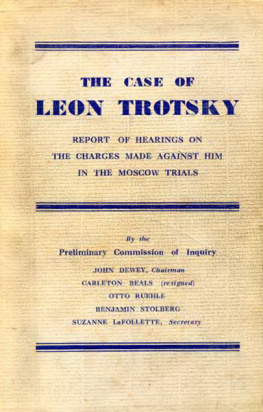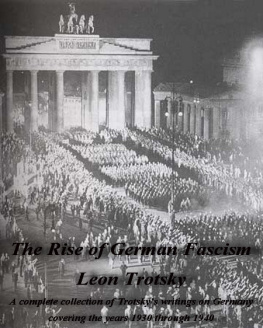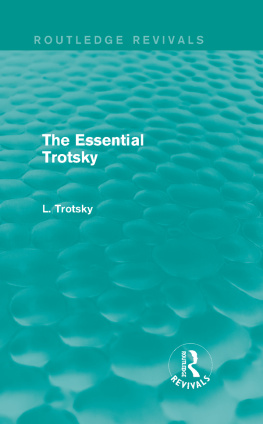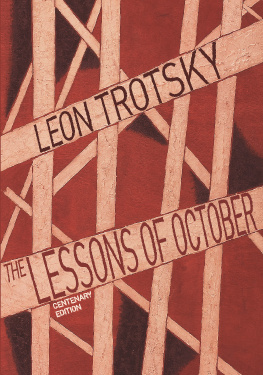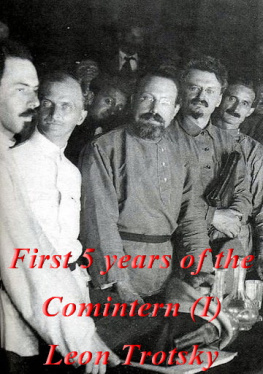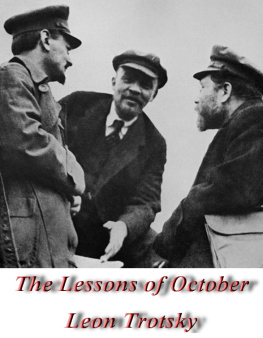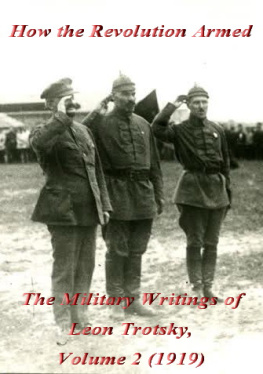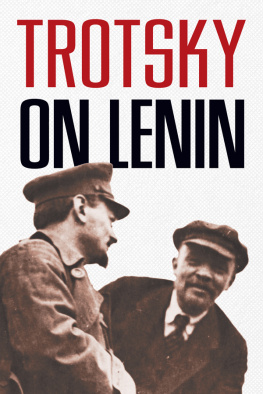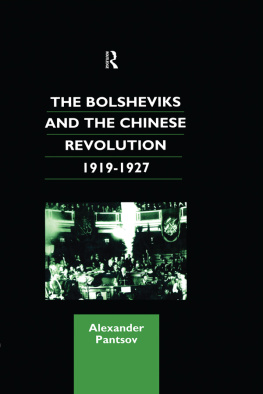Trotsky - First 5 Years of the Comintern: Vol.2 (1924)
Here you can read online Trotsky - First 5 Years of the Comintern: Vol.2 (1924) full text of the book (entire story) in english for free. Download pdf and epub, get meaning, cover and reviews about this ebook. publisher: Marxists Internet Archive, genre: Politics. Description of the work, (preface) as well as reviews are available. Best literature library LitArk.com created for fans of good reading and offers a wide selection of genres:
Romance novel
Science fiction
Adventure
Detective
Science
History
Home and family
Prose
Art
Politics
Computer
Non-fiction
Religion
Business
Children
Humor
Choose a favorite category and find really read worthwhile books. Enjoy immersion in the world of imagination, feel the emotions of the characters or learn something new for yourself, make an fascinating discovery.
First 5 Years of the Comintern: Vol.2 (1924): summary, description and annotation
We offer to read an annotation, description, summary or preface (depends on what the author of the book "First 5 Years of the Comintern: Vol.2 (1924)" wrote himself). If you haven't found the necessary information about the book — write in the comments, we will try to find it.
First 5 Years of the Comintern: Vol.2 (1924) — read online for free the complete book (whole text) full work
Below is the text of the book, divided by pages. System saving the place of the last page read, allows you to conveniently read the book "First 5 Years of the Comintern: Vol.2 (1924)" online for free, without having to search again every time where you left off. Put a bookmark, and you can go to the page where you finished reading at any time.
Font size:
Interval:
Bookmark:
Comrades, the internal causation and lawfulness of historical development wasformulated for the first time by Marxist theory. The theory of Marxism, as Marx himself wrote inthe introduction to his work Critique of Political Economy, establishedapproximately the following proposition with regard to revolution: No social system departs fromthe arena until it has developed the productive forces to the maximum degree attainable under thegiven system; and no new social system appears on the scene unless the economic premises necessaryfor it have already been prepared by the old social system. This truth, which is basic forrevolutionary policy, unquestionably retains all its meaning as a guide for us to this very moment.But more than once has Marxism been understood mechanically, unilaterally and thereforeerroneously. Wrong conclusions may likewise be drawn from the foregoing proposition.
Marx says that a social system must leave the scene once the productive forces technology, mans power over nature can no longer develop within its framework. Fromthe standpoint of Marxism, historical society, as such, is an organization of collective man man in the aggregate for the purpose of increasing mans power over nature.Of course this goal is not posed extrinsically by human beings, but in the course of theirdevelopment they struggle for it, adapting themselves to the objective conditions of theirenvironment and constantly increasing their power over natures elemental forces.
The proposition that conditions for a revolution for a deep-going social revolution andnot simply for superficial, though sanguinary. political overturns conditions for a socialrevolution which replaces one economic system by another, are created only when the old socialorder no longer leaves room for the development of productive forces this proposition doesnot at all mean that the old social order unfailingly collapses as soon as it becomes reactionaryin the economic sense, that is, as soon as it begins to retard the development of the technologicalpower of man. Not at all. For while the productive forces constitute the basic driving force ofhistorical development, the latter nevertheless occurs not separate and apart from human beings,but through them. The productive forces the means whereby social man dominates nature take shape, it is true, independently of the will of any single individual and are onlyslightly dependent upon the common will of human beings alive today, because technology representsthe accumulated capital inherited by us from the past, which impels us forward, and which undercertain conditions also holds us back. But when the productive forces, when technology become toorestricted within an old framework, say that of slavery, or feudal or bourgeois society, and when achange of social forms become necessary for the further growth of mankinds power, then thisis not accomplished automatically, like the sun rises and sets, but must be accomplished throughhuman beings, through the struggle of human beings welded into classes. To replace a social class,governing an old society that has turned reactionary, must come a new social class which possessesthe program for a new social order meeting the needs for the development of productive forces, andwhich is prepared to realize this program in life. But it by no means always happens when a givensocial system has outlived itself, i.e., has turned reactionary, that a new class appears,conscious enough, organized enough and powerful enough to cast down lifes old masters andpave the way for new social relations. No, this does not at all always happen.
On the contrary, more than once, it has happened in history that an old society exhausteditself, for example, the ancient slave society of Rome and preceding it there were theancient Asian civilizations whose foundation of slavery opened up no room for the development ofproductive forces. But within this outlived society there existed no new class strong enough tooverthrow the slave-holders and institute a new, a feudal, system, because the feudal system was,compared to slavery, a step forward.
In its turn, within the feudal system there was not always to be found in the hour of need a newclass, the bourgeoisie, to overthrow the feudalists and to open the road for historicaldevelopment. It has more than once happened in history that a given society, a given nation, orpeople, or a tribe, or several tribes and nations, living under similar historical conditions, haverun up against the impossibility of developing any further on a given economic foundation slavery or feudalism but inasmuch as no new class existed among them capable of leadingthem out to the main highway, they simply fell apart. The given civilization, the given state, thegiven society disintegrated. Mankind has thus not always moved upwards from below in a steady,rising curve. No, there have been prolonged periods of stagnation and there have been regressionsinto barbarism. Societies rose upwards, attained certain levels, but were unable to maintainthemselves upon these heights. Mankind does not remain standing in one place, owing to class andnational struggles its equilibrium is unstable; a society that is unable to move forward, fallsback, and if no class exists to lift it higher, this society begins to fall apart, opening the roadto barbarism.
For a clear conception of this extremely complex problem, the general abstract considerations Ihave just developed do not suffice, Comrades. Young Comrades with little experience in suchquestions should apply themselves to a study of historical works in order to master the factualmaterial pertaining to the history of different countries and peoples, particularly and especiallytheir economic history. Only then is it possible to attain a more concrete and clearer conceptionof the inner mechanics of society. This mechanics must be clearly understood in order to applyMarxism correctly to tactics, i.e., to the class struggle in practice.
Some comrades have a far too simplified approach to the victory of the proletariat.There obtains today not alone in Europe but on a world scale a situation which permits us, from thestandpoint of Marxism, to say with complete assurance that the bourgeois system has completelydrained itself. The world productive forces cannot develop further within the framework ofbourgeois society. On the contrary, what we have witnessed during the last decade is the fallingapart, the disintegration of the economic foundations of capitalist society coupled with the use ofmachines for the destruction of accumulated wealth. We are now living in conditions of the mostappalling and unprecedented crisis in world history, not simply a periodic normalcrisis unavoidable in the process of the development of productive forces under capitalism,but a crisis which signifies that the productive forces of bourgeois society are falling apart anddecomposing. There still may be ups and downs, but, in general, as I told the comrades in this veryhall a month and a half ago, the curve of capitalist economic development swings through all thefluctuations, not upwards but downwards. But does this mean that the doom of the bourgeoisie isautomatically and mechanically predetermined? No. The bourgeoisie is a living class which has risenon specific economic, productive foundations. This class is not a passive product of economicdevelopment, but a living, dynamic, active historical force. This class has outlived itself, i.e.,has become the most fearsome brake upon historical development. But this must not at all be takento mean that this class is prone to historical suicide, that it is ready to say, Since thescientific theory of historical development finds me reactionary, therefore I leave thescene. Of course, there cannot even be talk of this. On the other hand, the recognition bythe Communist Party of the fact that the bourgeois class is condemned and subject to elimination,is likewise far from sufficient to assure the victory of the proletariat. No, the bourgeoisie muststill be defeated and overthrown!
Font size:
Interval:
Bookmark:
Similar books «First 5 Years of the Comintern: Vol.2 (1924)»
Look at similar books to First 5 Years of the Comintern: Vol.2 (1924). We have selected literature similar in name and meaning in the hope of providing readers with more options to find new, interesting, not yet read works.
Discussion, reviews of the book First 5 Years of the Comintern: Vol.2 (1924) and just readers' own opinions. Leave your comments, write what you think about the work, its meaning or the main characters. Specify what exactly you liked and what you didn't like, and why you think so.

